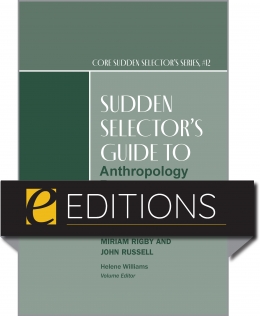
Primary tabs
You don't need to be an ALA Member to purchase from the ALA Store, but you'll be asked to create an online account/profile during checkout to proceed. This Web Account is for both Members and non-Members. Note that your ALA Member discount will be applied at the final step of the checkout process.
If you are Tax-Exempt, please verify that your account is currently set up as exempt before placing your order, as our new fulfillment center will need current documentation. Learn how to verify here.
- Description
- Table of Contents
- About the authors
Anthropology is arguably one of the most diverse fields in academe. It ranges in focus from archaeology to evolution and primate studies, to linguistics, and to observation of current cultural practices. Methodologically, it may include any combination of lab work, library and archival research, and fieldwork. The materials vary significantly, including visual records such as film and photography, sound recordings, ancient artifacts, dusty notebooks, digital records, and biological materials. In practice it is highly interdisciplinary, intersecting with biology, political science, geography, art history, literature, religion, sociology, history, and more. Collection development for any subject can be a challenging task; anthropology, with its many subfields, may exceed the typical challenge. Whether you are brand new to anthropology, or well-versed in many of its facets, Sudden Selector’s Guide to Anthropology is designed to provide you with an access point to the diverse realms of the field and the resources that will allow you to build and maintain strong collections to serve your community, no matter where their research interests lie.
The Sudden Selector’s series is designed to help library workers become acquainted with the tools, resources, individuals, and organizations that can assist in developing collections in new or unfamiliar subject areas. This guide is designed to facilitate collection development processes in two ways: it is a bibliography of resources and can be used as a mini-course in anthropology librarianship.
Chapter 1. What is Anthropology?
Chapter 2. Anthropology Librarianship
Chapter 3. Anthropology Resources
Chapter 4. Selection and Acquisition for Anthropology: Selection Tools and Monographs
Chapter 5. Selection and Acquisition for Anthropology: Serials and Other Non-Monographic Formats
Miriam Rigby
Miriam Rigby is a social sciences librarian and serves as the collection manager for the social sciences at the University of Oregon Libraries. She earned her MLIS from University of Washington and a MA in cultural anthropology from the University of Chicago. Miriam’s research interests currently are focused on instruction and open access publishing.
John Russell
John Russell is assistant professor and digital humanities librarian at The Pennsylvania State University Libraries and associate director of the Center for Humanities and Information. Prior to Penn State, he was scholarly communications librarian and a subject specialist for the social sciences at the University of Oregon and a subject specialist for History and Anthropology at Georgia State University. He has been active in scholarly communication initiatives in Anthropology, including the Mana’o Repository and the transition of the journal Cultural Anthropology to open access.


